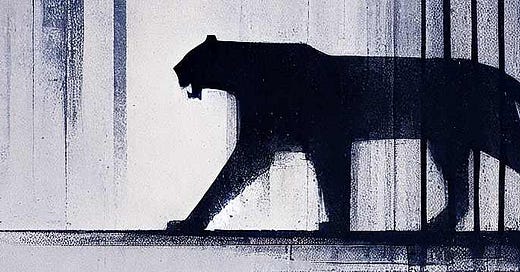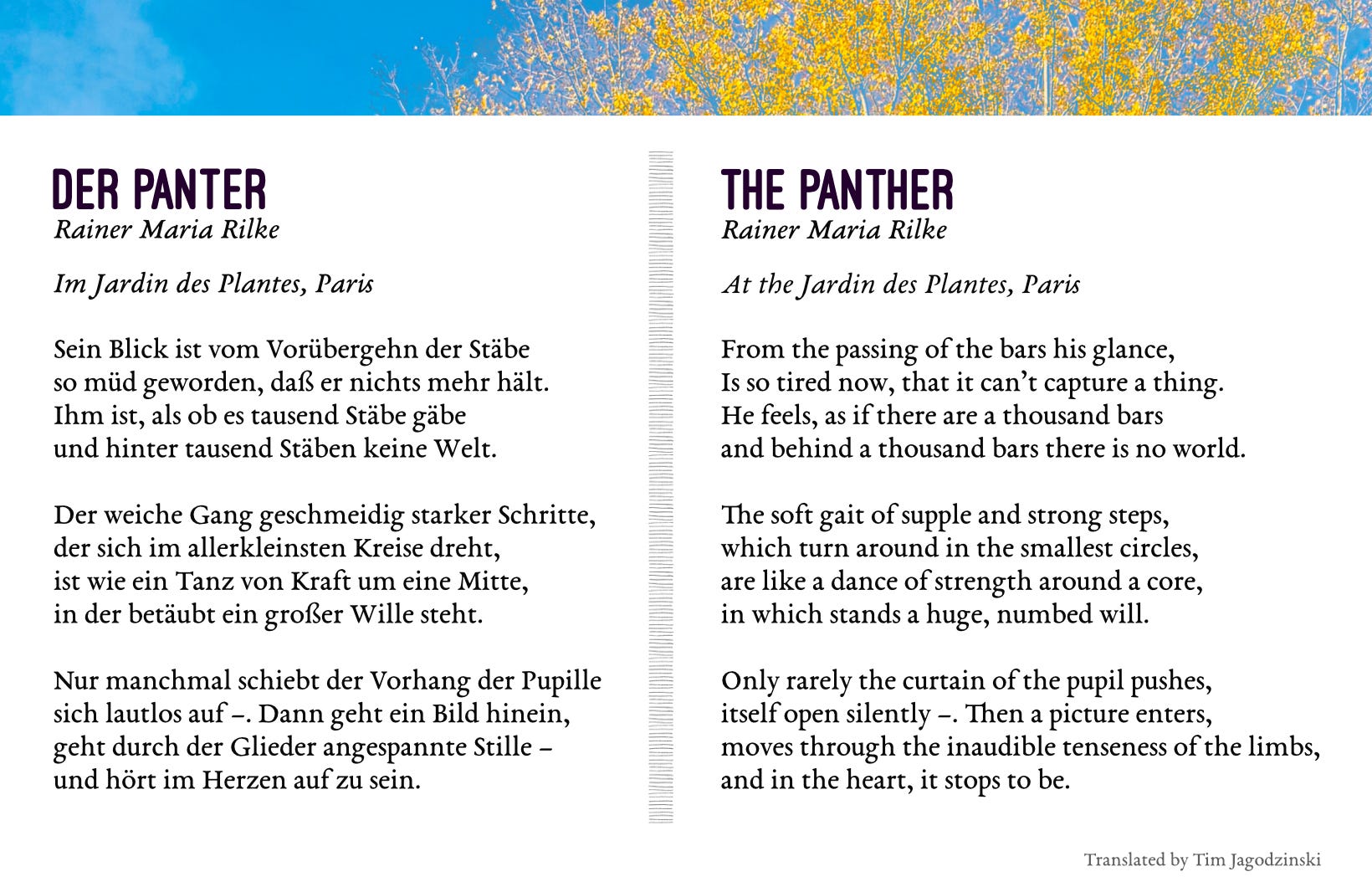Rainer Maria Rilke, Der Panther Translation and Discussion
For the start of this series, I'd like to translate my all-time favourite poem by Rainer Maria Rilke, undoubtedly one of the greatest poets of all time writing in German.
Before we start, I encourage you to explore the theme of this poem yourself by using these two writing prompts. If you come up with additional or even better prompts, feel free to share them in the comments!
Prompts:
Pick a picture of an animal and look at it in detail to write about it.
(If you can watch a live animal, even better!)Write about an experience someone else had, that mirrors the panthers experience in the poem.
Introduction
Rilke wrote this poem between 1902 and 1903 in the “garden of plants” in Paris. At this place, several wild animals were kept in cages to be observed. This drew many painters who had the chance to see animals they would not have access to otherwise.
The key skill for painters is the ability to observe what they want to depict carefully and in detail. This is something Rilke learned on his path to poetry and is also an important skill for writing in general. The ability to look at something until you can see aspects that are normally hidden in the subconsciousness is what uncovers the magic and beauty of the world. For “The Panther” Rilke did not focus on the caged animal like the Artists do, which would have been easier, but he took the perspective of the animal instead. This choice made him rejected the human perspective that came naturally to him. Imagine it as painting a self-portrait of another person.
Not only did this result in beautiful language, but it also illustrates something many novice poets struggle with. This poem is not about how Rilke feels or his perspective. It is written with deep empathy for another being—the panther.
In this way, it transcends the egocentrism we all feel.
Translation
Analysis
As I noted in the preamble, I love the beautiful language and the chosen perspective of the poem, but what the panther feels is something modern people can relate to very well.
In the first stanza, Rilke explains that the panther has resigned. He might have dreamed of freedom, but all he can do is look through the bars and walk around. The bars are in every line of sight available to the panther and the world behind them seems to vanish. Obviously, it’s not the world that is vanishing but the hope and dream of reaching it.
In the second stanza, Rilke focuses on the animal itself. The panther is strong and knows how to use his strength, but he is forced to move in circles. All his strength is just a display of futility as he cannot act out his will. This movement without moving forward is what makes him numb.
The final stanza combines the elements of the first and second stanza to the final outcome these conditions create. “Then a picture enters” is a metaphor for hope. This hope, like adrenalin, moves through the body to arrive at the heart — only to vanish there. This happens because the panther is forced to walk in circles, just like people also might ruminate in circles. Every time he catches hope, it ends in disappointment and this endless repetition prevents him from accepting this feeling as real. Hope itself dies in the heart, finalising the resignation.
Final Thoughts
This poem could be easily rewritten to be about urban isolation, about our digital life style where we see fewer people and the people we communicate with are behind screens, that might as well be bars preventing us from connecting with the world in a real way.
Where Rilke saw a powerful animal in a cage that robbed it of its purpose, I see many people in their rooms squandering their potential or being prevented from fulfilling it. They are robbed of their purpose by infinite entertainment, as we scroll endlessly just like the panther walked in endless cycles.
At the same time, many issues we suffer from — be it the impossibility of affording housing, getting a job, finding friends, or building deeper relationships — are just like the bars in front of the panther too. It takes so many tries; there are so many obstacles in our paths.
It easily seems as though, behind all this social, financial and spiritual rejection, the world we want to touch is just an abstract, unreachable place. It does matter little for the individual if we are the panther in the cage or if we are facing the barriers of modern life. This poem Rilke wrote long before our reality did exist reminds us that isolation und unmet purpose have a steep price.
But we are in the happy situation to be humans and most if not all of us are capable of wonderful things which includes the ability to escape from our cages. This poem and works like it help us to perceive our cages in the first place.
Knowing we are trapped, is the first step to escaping from it.
Thank you! ❤️
Thank you for reading my translation and thoughts about “Der Panther” (The Panther). If you already knew the poem, I hope revisiting it gave you some insight, and my thoughts about it made you think. If you have an opinion about the poem or what I wrote about it, I’d be thrilled to read about it!
Thank you for reading and reflecting. I’d love to hear your thoughts.
Warmly,
Tim Jagodzinski







